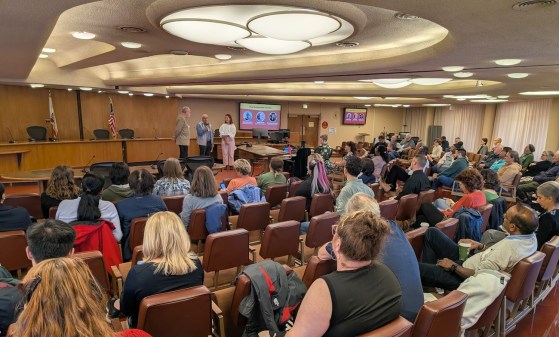California court system ‘totally rocked’ its digital transformation

A court system in the San Francisco Bay Area completed its transition earlier this month from outdated computer systems and relying on paper-based operations to services that are digital by default.
The move to digitizing systems at the Marin County Superior Court intended to modernize the courts processes as well as increase public access to justice, the court Executive Officer James Kim said in an interview with StateScoop.
“We really needed to digitize our records because that would provide meaningful access needed to the community here and then from the [court’s] strategy, we decided that, well, we also need a new system,” Kim said.
The transition was also a bit of a practical matter. Located in San Rafael in the Marin County Civic Center, designed by prolific American architect Frank Lloyd Wright, Kim said that the building’s sprinkler system wasn’t sufficient to protect the court’s records in the event of a fire.
As part of the project, the Marin County Superior Court digitized all its new and archived court documents and created a new online portal to provide attorneys and members of the public access to case information. The court’s case management systems were also updated to automate case-processing workflows and staff can now process case-related data and documents in real time with the help of artificial intelligence.
With the move, the court seeks to not only enhance its speed and transparency, but also improve the experience of litigants in court. With digitized services, those involved in the court system are no longer required to visit a specific court location in the county and can be served outside of normal office hours. However, paper-based and in-person court services will still be available to those who need them, according to a release.
So far, Kim said, the transformation has already made the court’s ability to process records and documents more efficient. By making court records more accessible to members of the public and attorneys, the court’s staff has more time to ensure that documents are processed accurately. He credits much of the transition’s success to the extensive change management training court employees underwent in preparation for the move.
“We’ve been able to focus on quality control,” Kim said. “We’ve been able to focus on how do we share information even within the criminal justice system more securely and accurately and efficiently.”
Planning and strategizing for the modernization project began well before the onset of the COVID-19 pandemic in 2020. And for a court system that relied on physical documents and records in its daily processes, staff were still required to come into work while much of the surrounding world shut down or transitioned to remote work in response to the health crisis. However, the “hyper-collaborative” nature of the court staff and its partners allowed them to continue making progress toward modernization goals, Kim said.
“It was just this amazing time where people were worried about COVID-19 and then we also had to keep up the mission of the court and serve people,” Kim said. “At the same time, sort of quietly, we were innovating. We were digitizing our records and we were working on this massive project. I can’t speak highly enough of the staff and the team that were here. We totally rocked it.”
The Marin County Superior Court project was led by Mission Critical Partners, a consulting firm that provides expertise on data-integration, networking and cybersecurity.
“The court took a systematic and principles-based approach to helping staff members, judicial officers and other stakeholders adopt these new tools and procedures,” Mission Critical Partners President of Consulting Services John Chiaramonte said in a press release. “These efforts have resulted in remarkable improvements in the delivery of justice services.”






